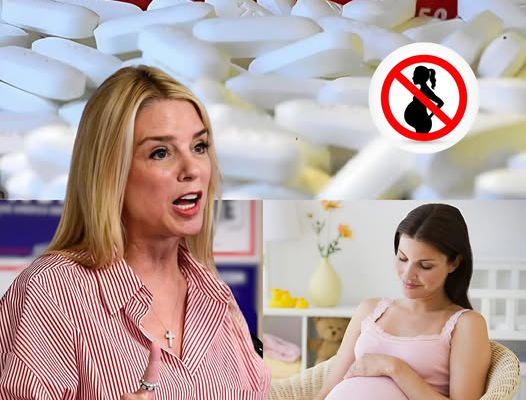PAM BONDI URGES CAUTION — BUT WHO HID THE TRUTH?

Buy vitamins and supplements
Family gamesPauseUnmute
Remaining Time -0:37
Washington, D.C. — A ripple of shock spread across the nation after the U.S. President’s recent comments regarding the safety of Tylenol during pregnancy. In a moment that caught both health professionals and families off guard, the President’s words raised questions that had long simmered beneath the surface but had never been directly addressed by the highest office in the country.
Into this storm stepped Pam Bondi, former Attorney General of Florida, with her unmistakable tone of urgency. Her message was simple, but piercing:
“The health of the fetus should not be taken lightly and when in doubt, consult a doctor.”
Her words, amplified across cable networks and social media platforms, immediately reached millions of American households — from expectant mothers clutching their growing bellies, to doctors, pharmacists, and policymakers suddenly thrust into the center of a firestorm.
But as the nation braced itself, an even larger and more disturbing question loomed: who knew what, and when?
The President’s Statement: A Spark in Dry Grass
It began during a press briefing on healthcare policy. The President, addressing a series of questions about maternal health and medication, offhandedly referenced concerns that had circulated in scientific journals but rarely reached public discourse: “Some studies suggest Tylenol use during pregnancy may have more risks than we originally thought.”
It was one sentence — short, vague, but explosive. Within minutes, hashtags like #TylenolPregnancy and #WhatDidTheyKnow trended on Twitter/X. Pharmaceutical stocks wavered, parent forums lit up with fear, and journalists rushed to confirm what, if anything, had been hidden from the public.
Pam Bondi’s Intervention
Pam Bondi, long known for her sharp commentary and advocacy on issues she deems moral as much as legal, immediately seized the moment. Appearing on Fox News and later issuing a written statement, she pressed for caution while demanding accountability.
“Families deserve transparency. If there is even a whisper of risk, mothers should know. No one should play God with the health of our children,” she declared.
Bondi’s words echoed not just as legal commentary but as a rallying cry to millions of anxious parents. And yet, her intervention also sharpened the most unsettling aspect of the controversy: who, if anyone, had been deliberately hiding the truth?
The Science Behind the Storm
To understand the panic, one must look at the scientific backdrop. For decades, acetaminophen (the active ingredient in Tylenol) has been considered one of the safest pain relievers for pregnant women. Unlike ibuprofen or aspirin, it was widely prescribed as the go-to option.
But in recent years, scattered studies — often buried in academic journals — have raised red flags: potential associations with developmental disorders, subtle neurological impacts, or other long-term outcomes in children exposed in utero.
The science remains inconclusive. Most medical professionals stress that the risk, if any, is minimal compared to untreated pain or fever. Yet, the sudden high-level attention to these studies turned what had been quiet academic debates into a national alarm.
Public Outcry: “Why Didn’t We Know?”

For many parents, the anger came not from the possible risks themselves, but from the suspicion that crucial information had been suppressed.
On parent forums, comments ranged from heartbreak to fury:
- “I took Tylenol every day of my pregnancy. Now I’m terrified. Why wasn’t I warned?”
- “If there was even a possibility of harm, we had a right to know. That’s not for corporations or politicians to decide.”
- “This feels like another cover-up. First tobacco, then opioids. What’s next?”
The distrust is not unfounded. American history is littered with cases where industries downplayed or concealed risks — from asbestos to lead paint to painkillers. To many, Tylenol’s global presence and corporate power make it a perfect candidate for suspicion.
The Suspects: Who Hid the Data?
Three possible culprits quickly emerged in the public conversation:
- The Pharmaceutical Companies
Johnson & Johnson, the corporate giant behind Tylenol, has long prided itself on trust and consumer safety. But critics argue the company has faced lawsuits before — from talcum powder to opioid marketing — and cannot be above scrutiny. Did they downplay studies to protect profits? - Federal Agencies
The FDA has historically categorized acetaminophen as safe for use in pregnancy. But were officials too slow to update guidance as new studies emerged? Were they pressured by industry lobbyists? - Political and Medical Establishments
Doctors, hospitals, and even lawmakers often walk a delicate line between reassuring the public and avoiding panic. Did this desire for calm lead to silence that now looks like negligence?
Lawsuits Brewing
It didn’t take long for legal action to follow. Within 48 hours of the President’s remarks, law firms across the nation began preparing class-action lawsuits. Several mothers who had long suspected a connection between Tylenol use and developmental challenges in their children came forward, their voices amplified by media outlets.
One mother in Texas, holding back tears at a press conference, said:
“If they knew and didn’t tell us, then every moment my child struggles at school is on them.”
Bondi, though not directly involved in the cases, hinted that she would support mothers in seeking justice: “If cover-ups exist, accountability must follow.”
Hospitals in Chaos
Inside hospitals and clinics, the fallout was immediate. Doctors were inundated with calls from worried expectant mothers. Pharmacies reported sudden drops in Tylenol sales. Obstetricians scrambled to prepare new guidelines, caught between incomplete science and mounting fear.
A doctor at a leading maternal health center confessed anonymously:
“We’ve known about these studies for years. But the data is not strong enough to change practice. Still, the silence — I admit — feels uncomfortable now.”
The Silence of Apple: A Curious Connection
Oddly, Apple entered the conversation as well — not because of medicine, but because of silence. Social media critics noted that Apple News, often a key source of trending headlines, featured far fewer stories about the Tylenol controversy compared to other outlets. Some users accused the tech giant of quietly suppressing the narrative to avoid panic.
Though there’s no evidence Apple had any connection to Tylenol or the pharmaceutical industry, the episode underscored a broader fear: in an age of algorithms and gatekeepers, who decides what truths the public sees?
Politically, the controversy is already reshaping debates on healthcare transparency. Opponents of the administration accused the President of sparking unnecessary panic. Supporters countered that he did what no one else had the courage to do — say out loud what others had whispered for years.
Pam Bondi’s sharp critique added fuel. Known for her fiery rhetoric, she accused both political parties of failing families: “This isn’t left or right. This is life or death. If there’s even a chance data was hidden, then we need a full-scale investigation.”
Congressional committees are now expected to hold hearings, with subpoenas likely targeting both pharmaceutical executives and agency officials.
Social Media: Rage and Relief
On platforms like TikTok and Instagram, the conversation has become intensely emotional. Influencers shared personal pregnancy journeys, some admitting they had taken Tylenol daily, others sharing alternative remedies.
One viral TikTok, viewed more than 12 million times, showed a young mother holding her baby and whispering: “I trusted you. Did you lie to me?”
At the same time, other voices stressed perspective: “Don’t panic. The data is still unclear. Talk to your doctor before making decisions.”
The Mystery of Responsibility
The central question remains unanswered: if consequences exist, who should bear the blame? Is it the companies that made billions? The government agencies that regulated too slowly? Or is it the broader culture of medicine that sometimes prioritizes reassurance over transparency?
As one columnist wrote in The Washington Post:
“The real scandal may not be that Tylenol is dangerous, but that truth is always the last thing mothers are told.”
A Call for Change
Pam Bondi’s words continue to echo: “The health of the fetus should not be taken lightly.” But beyond caution, her statement has galvanized a demand for systemic change. Activists now call for:
- Mandatory disclosure of all studies related to drugs commonly used in pregnancy.
- Independent review boards free from corporate influence.
- Transparency laws ensuring that both risks and benefits are communicated directly to consumers.
If these reforms take hold, the Tylenol controversy may be remembered not just as a scandal, but as a turning point.
Conclusion: A Nation on Edge
For now, America waits — for answers, for hearings, for clarity. In the meantime, expectant mothers sit with uncertainty, balancing trust in their doctors with unease about what has been hidden.
The controversy is not just about a pill. It is about trust, transparency, and the fragile contract between citizens and the institutions sworn to protect them.
Pam Bondi’s warning may have been brief, but its resonance is undeniable. It forced the nation to ask: what else don’t we know?
And until the truth emerges, every bottle of Tylenol on a bedside table may feel less like medicine — and more like a question mark.




